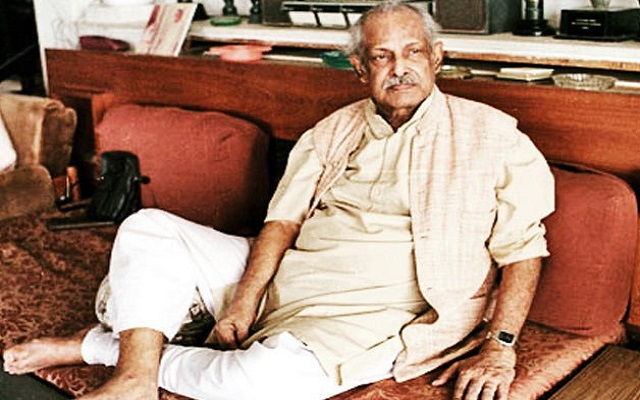I have lost count of the number of times I’ve ugly-laughed while watching a Hrishikesh Mukherjee film. I say ‘ugly-laughed’ because while there’s beauty and elegance in the way ‘Hrishi-da’ deployed different styles of humour (slapstick, linguistic, understated) in his work, my laughter frequently sounds like a small, morose car struggling on a cold morning; call it Thomas the Dank Engine. Mukherjee, born exactly 100 years ago today, would have had a hearty chuckle himself at so many aspects of life and culture circa 2022, two decades after his death. He was the kind of filmmaker who would’ve captured a lot of unexpected, off-kilter humour about life under lockdown, one feels certain. Imagine going through a months-long shut-in alongside somebody like Bhavani Shankar, for example. Portrayed by Utpal Dutt, this most beloved of Hrishikesh Mukherjee characters was a comically over-the-top grouch, a severe man whose forbidding countenance was matched only by his disapproval of young men who were into sports or music or dance. Bhavani Shankar’s ‘moral panic’ is encapsulated by the immortal image of Utpal Dutt going “Eeesshhh!” in a wince of said disapproval. And although there were several protagonists throughout Mukherjee’s filmography who can be called ‘painfully sincere’ — Dharmendra in Satyakam comes to mind immediately — Mukherjee was also fond of poking gentle fun at these sombre men, nudging them ever-so-gently into taking themselves a little less seriously. So much has gone so catastrophically wrong with the world over the last decade or so (epidemics, inflation, mass displacement) that a lot of our responses fall under this category; trust Mukherjee to have extracted benevolent humour even from situations like this. And why just filmmakers? I feel certain that Mukherjee would also have a few well-chosen thoughts about retroactive criticism, or a rather cursory application of the practice common these days, wherein very old stories are ‘assessed’ entirely on the basis of extremely contemporary socio-political configurations and ideas. In Jai Arjun Singh’s 2015 book The World of Hrishikesh Mukherjee, the writer and journalist describes how this particular brand of unthinking criticism is often levelled at the director’s Namak Haraam, the 1973 Rajesh Khanna-Amitabh Bachchan comedy. Apparently, certain prominent socialists—and filmmakers sympathetic to their aims—were not happy with the ending of the movie and told Mukherjee exactly that. The director insisted that in real life, revolutions are hard to come by, particularly so in a place like Bombay. He was as right then as he would be today. “Watch it at the level of an intimate, small-canvas story about a friendship between two men, ask yourself if the characters of Somu and Vicky — and what happens to them over time — are plausible, and chances are you will find it a satisfying film. It is when you approach it with the assumption that Vicky and his father represent the Evils of Capitalism and Somu represents the Middle-Class Man Whose Conscience Is Awakening, that you think of the ending as a ‘cop-out’ (to evoke a word that many critics used).” Ultimately, though, Mukherjee would have laughed the hardest at the fact that today, the practice of comedy itself seems to have been caught in the irony trap. Today, humour is an extremely aggressive version of itself, armed with a predatory instinct typically reserved for much more intense emotions. Everything funny on the Internet, it seems, comes about by ‘owning’ someone, or ‘destroying’ them on live camera. There aren’t counter-arguments anymore, there are ‘dunks’ and ‘burns’ and a whole array of sub-tweets and sly tweets and seemingly infinite, irony-doused modes of expressing every single half-thought that enters your mind (what might the great man have made of Twitter? The mind boggles with the possibilities) And that was always Mukherjee’s wheelhouse: the ability to be genial while poking fun at people, the ability to be likeable in humour rather than coming across as incurably snarky. His films are filled with genteel, eccentric men like Dharmendra’s Professor Parimal Tripathi, the botany professor with a fondness for pranks (and Sanskritised Hindi) in Chupke Chupke (Mukherjee himself taught math and science at one point in life). The world needs more Professor Parimals today, I can say this much. Yes, it needs more Bhavani Shankars, too, for what it’s worth. We need the warmth and the mirth and the intimacy and the endless nuggets of home-grown wisdom that Hrishikesh Mukherjee’s work exuded; a truly congenial genius if ever there was one.
Born 100 years ago to this day, the iconic director would have found plenty to chuckle at when it comes to life circa 2022–especially the modes in which we as a society seem to consume and produce humour.
Advertisement
End of Article


)
)
)
)
)
)
)
)
)



